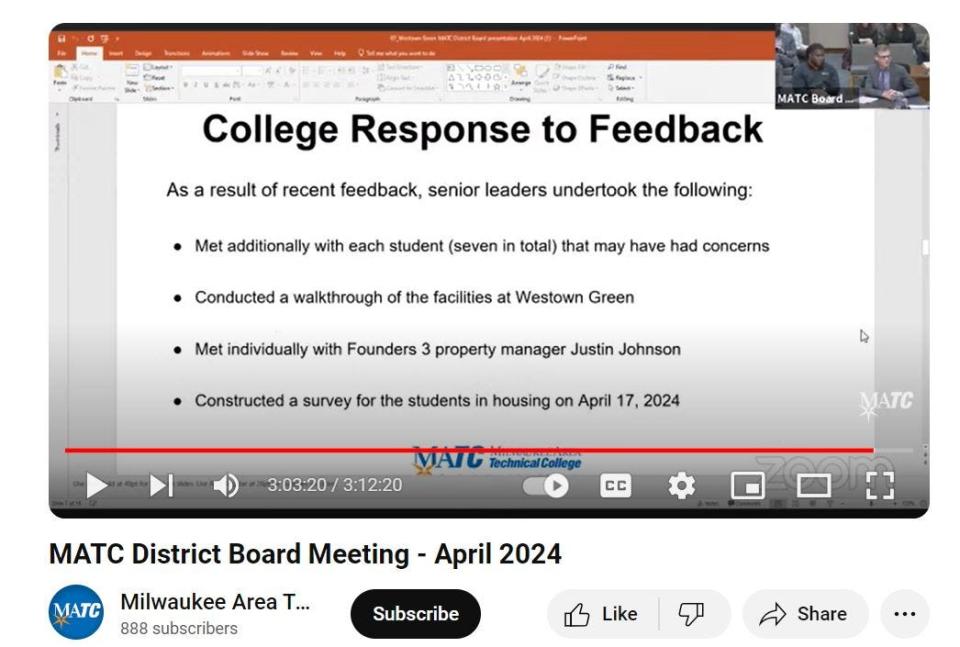John Williams is clear: He wants to be someone who helps others.
Recently, he’s been figuring out how to do that — on a systemic level.
Williams and fellow Milwaukee Area Technical College student Marz Ezeji have spent the past year learning how their public college operates, then creating a plan to advocate for improvements to its student housing. They’re part of the Changermakers Fellowship, a program giving basic training in public advocacy to college students.
The goal is to give students the tools they need to address broader issues on their campuses.
Believe in Students, the nonprofit behind the fellowship, has a broader goal to reform the higher education system to better serve students’ basic needs, like housing and food security. Along with MATC’s faculty union, Believe in Students also helped found the college’s Fast Fund in 2016, the resource that provides emergency financial grants to students.
Williams and Ezeji are part of the fellowship’s 2023-24 cohort, the second ever since its launch. They spent the year-long program documenting students’ housing experiences, then putting them together to share with the public and MATC leadership.
“If we can make these students’ basic needs of housing survival better, then look at the statistics. Look at the records. We can actually do better in school. Milwaukee will become a better place all around,” said Ezeji, a 30-year-old student studying animation.
Williams, a 27-year-old student studying computer simulation and gaming, joined the fellowship without prior advocacy experience. He was initially nervous, he said; now, talking to students about what impacts them gives him a rush.
“Honestly, before, I really wasn’t a team person; this brought me together and helped me realize there’s a bigger picture out there to helping multiple people and working together for a greater cause, to try to change the world one by one,” he said.
Figuring out how to navigate the public system
For activists, understanding how public systems operate is key: Change often begins by speaking at public meetings, tracking laws in the Legislature, organizing coalitions of advocates and gathering data to present to those in positions of power.
But that type of knowledge isn’t widespread. That’s why it’s in the curriculum for the Changemakers fellows, whose formal task is to create an advocacy plan for a specific issue on their campus.
Williams and Ezeji focused their fellowship on Westown Green, a student housing complex in downtown Milwaukee with about 200 students. They spent months interviewing residents, conducting a survey and putting those findings into a report. They identified students’ concerns about building management, overseen by an outside firm; roommate pairing processes and safety issues in the building, among other topics.
Those are issues Ezeji said they know first hand, having lived at Westown Green, and were made worse by discrimination against their trans identity. But Ezeji said the experience makes them want to advocate for future students’ expriences to be better.
“I feel like you just need to be kind to individuals, and listen, and let them know that their voice is powerful,” Ezeji said.
Working with MATC’s Fast Fund, the fellows recruited speakers to appear at meetings of the MATC District Board between December and April. As a result, Westown Green appeared on the board’s April 23 agenda. Two administrators gave presentation about the college’s oversight of the student housing complex, then took questions from the board.
“The reason I asked how the structure of how the college is dealing with this has changed, if it has changed … is because if there haven’t been any changes, when what we’re doing isn’t adequate, because we’re getting all of these concerns expressed,” said Mark Foley, chair of the board, at the meeting.

MATC created Westown Green specifically to help address housing insecurity among its student population, spokesperson Darryll Fortune said via email. MATC administrators met with students to hear their concerns about Westown Green this school year, he said, and held listening sessions along with the management firm for its residents. The firm is also exploring whether to use a roommate pairing tool next academic year, he said.
The Changemakers Fellowship works by pairing students with people who have experience in public advocacy, often from a faculty union.
In MATC’s case, it was Liz Franczyk, the executive director of the Fast Fund — founded in collaboration with the AFT Local 212 union — and Student Advocacy Director and nursing student Elsa Lysette. The American Federation of Teachers national union is helping fund fellowship.
More: FAST Fund executive director will ride bike for 24 hours to fundraise for emergency assistance for MATC students
“When this started, I didn’t know anything about Westown Green. It didn’t directly affect me. But now it’s the most important thing in the world to me, that’s how deep we’ve been in with it,” Lysette said.
Believe in Students wants to change the image of a ‘college student’
Most people picture a “college student” as an 18-year-old from a middle or upper class family living in a residence hall, said Traci Kirtley, executive director of Believe in Students.
But that’s not the reality, she said, and that misconception comes back to harm students. In reality, college students can be anyone — like people who are parents, or earning a degree part-time while working a full-time job. She wants to see higher education systems better designed for those students.
“We really need our higher education system to be built to serve that student,” she said. “Everything from funding, to the kinds of supports that you offer, to how classes are structured, to how you earn degrees.”
The Changemakers Fellowship fits into that model, she said. Colleges that participate are all relatively “open access,” and serve a large population of low-income and first-generation students.
MATC is among them: 92% of its students are part-time, and 40% receive either need-based financial assistance or have an income at or below the federal poverty level, according to Wisconsin Technical College System data.
Of the four colleges participating in the 2023-24 fellowship cohort, including MATC, Kirtley said other projects mostly focused on food access.
Ezeji said the fellowship meant conducting a lot of research about basic needs issues in higher education, which served as a reminder that they aren’t alone in experiencing them.
“Yes, I might not see the outcome of what we’re all doing, but at least no one else will have to experience it in the future if we keep using our voices and speaking up,” Ezeji said.
Cleo Krejci covers higher education, vocational training and retraining as a Report For America corps member based at the Milwaukee Journal Sentinel. Contact her at [email protected]. Follow her on X at @_CleoKrejci. Support her work with a tax-deductible donation at bit.ly/RFADonation.
This article originally appeared on Milwaukee Journal Sentinel: MATC Changermakers Fellows tackle student housing at Westown Green
Source Agencies

